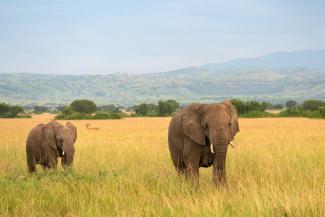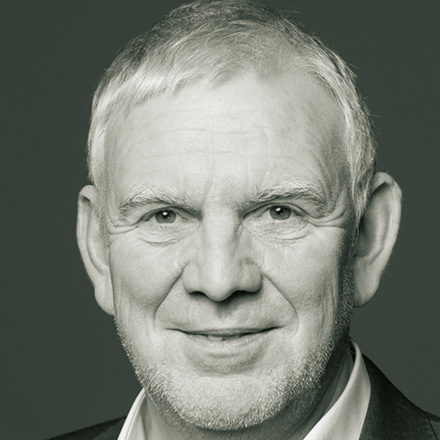Coherent policymaking
Weak governance systems do not consider long-term trends
 picture alliance / CHROMORANGE / Alexander Ludwig
picture alliance / CHROMORANGE / Alexander Ludwig
What impacts of the climate crisis are currently hurting people in East Africa?
There are three main hazards: drought, flooding and shifting seasons. The third is actually the most important for nature-economies where agriculture is the dominant sector. Unfortunately, it is getting the least attention. Changing weather patterns reduce food production and incomes. Subsistence farming is affected worse, because smallholders cannot afford to invest in new equipment or inputs. They have no wiggle room. Of course, the impact on commercial farms is bad too. When drought or floods occur, they are often devastating of course. People in some parts of Kenya and neighbouring regions in Ethiopia and Somalia are currently suffering food insecurity because rainfall was erratic and insufficient.
What does Covid-19 mean in this context?
Well, the pandemic is not over, so it’s impossible to give a conclusive assessment (see Ben Ezeamalu on www.dandc.eu). Several things are evident nonetheless. Poverty has increased. The urban poor could not work during lockdowns. Food distribution suffered because markets had to close. Fresh produce could thus not be distributed, and prices dropped dramatically. For example, a bunch of bananas that previously would have fetched the equivalent of four US dollars suddenly was only worth ten cents. In our world region, moreover, rural-urban dynamics matter very much. Typically, people who live in the villages depend on some kind of financial report from relatives or well-wishers in the cities. In times when poverty gets worse in urban areas, it therefore gets worse in rural areas too. Moreover, public services deteriorated, especially in rural areas where they were weak to begin with.
What are the environmental consequences?
The pressure on marginal land has been increasing faster than it usually would. Village people are desperate to expand their fields. A certain pressure exists all the time as all countries in the East African Community have population growth rates of at least 2.3 %. Because of the pandemic, however, we lost even more forest, grasslands and wetlands than we normally would. Those losses always weaken ecosystems, not least because they further reduce biodiversity, and one consequence is that nature’s resilience to climate change keeps dwindling. At the same time, carbon is released into the atmosphere, so the climate crisis is further exacerbated. In our part of the world, poverty, population growth and the global environmental crisis are mutually reinforcing phenomena. Coronavirus has made everything worse.
Do African countries need stimulus programmes to improve matters in the sense of a green recovery or a green new deal? The guiding idea is to do two things at once: fight poverty and support the transition to a sustainable economy.
We certainly need the economy to recover and to get people out of the pit. I am not sure, however, that “green recovery” is a term that describes what is happening. Our governments are focusing on getting the economy started again. That is their top priority. They do not worry much about environmental sustainability. We certainly still need economic growth if we want to reduce poverty, but it is unfortunately less obvious to everyone – at least in the short term – that growth must be environmentally sustainable. Our systems of governance tend to be weak, but only strong systems are able to take longer-term trends into account. In LDCs, public finances are generally stretched. That means that the scope for stimulus programmes is very small, which in turn reinforces the disposition to think in the short term.
So when governments do consider environmental issues, they are probably more interested in adaptation to climate change than in mitigation?
Yes, the thinking is that African countries have contributed very little to causing global heating so they cannot do much to control that problem. At the same time, least-developed countries (LDCs) are especially exposed to the impacts, so everyone understands that we must adapt. This reasoning is flawed however. Yes, it is true that, in our countries, transportation, power generation and industries do not emit huge quantities of greenhouse gas emissions. However, deforestation, the loss of wetlands and the degradation of ecosystems in general do contribute to the climate crisis. Our contribution to mitigation should be to stop those trends.
And what can a country like Uganda do to adapt to a hotter climate?
There’s a lot we can do. When infrastructure was built in the past, weather risks did not get much attention. That has changed. Today, potential flooding is slowly being considered in the planning and construction of cross-country roads. In similar ways, we can make sure that infrastructure such as power supply stays operational in cases of excessive rainfall or unusual heat. In regard to agriculture, a lot can be done as well. Small-scale irrigation schemes are most valuable, they often involve water harvesting. By storing water when it rains, we can boost farming in general and considerably reduce the impact of drought. African governments are aware of these things, so they feature in national adaptation plans. Nature-based solutions are the best options because they are very cost-effective and typically contribute to climate mitigation as well as adaptation.
Please tell us more about nature-based solutions?
Well, many communities depend on natural resources, so communities’ resilience typically depends on the resilience of the ecosystems they live in. Ultimately, this is about making people´s livelihoods compatible with sustainable land use, instead of only trying to maximise the output of agriculture in the short term by adopting supposedly modern technologies (also see Susanne Neubert on www.dandc.eu). A very promising project is the Adaptation Fund Wetlands Restoration Project, which is implemented by Uganda´s Ministry of Water and Environment. The local people are directly involved, and they are keen on making things work out because they understand just how important the natural resources are. Of course, grasslands, forests and savannahs deserve attention too.
Let’s return to the topic of stimulus programmes. High-income nations have invested trillions of dollars, but low-income nations cannot afford government spending of that kind. What international assistance do you need?
Well, we certainly need funding. Whether you call it climate finance, official development assistance or debt relief does not matter much. Money is not everything however. As I said earlier, systems of governance matter very much. They must ensure that money flows to where it is needed most – grassroots communities. Funding from international agencies should therefore go along with technical cooperation to boost state capacities. International agencies should not only talk to national governments; they must also pay attention to community-based organisations who know best what is needed in terms of infrastructure, health care, education, public services et cetera. Central governments generally understand that international support which we need can actually reach the places where the impacts are felt. In fact, there is an initiative started by LDCs governments to promote this cause. It is called the LDC Initiative for Effective Adaptation and Resilience (LIFE-AR). It was signed by national governments, but the programme is designed to support local governments in building effective systems and financing mechanisms to boost grassroot resilience.
Bilateral and multilateral agencies cannot bypass state agencies when they attempt to deliver support. Unfortunately, they do not find powerful sub-national partners everywhere as easily as in Kenya, where county governors are quite influential.
Yes, it is important to decentralise governance, and again, technical cooperation can help. On the other hand, cross-border thinking is needed too. In Africa, traditional community life largely ignores national borders. Nomadic communities move from place to place, and in times of crisis, other people start fleeing to relatives, who may live in a different country. In such settings, support for a specific communities in need should not be limited to a single country. More generally speaking, policymakers should always pay attention to these things. We are dealing with global problems and certainly need international solutions.
Link
Further information on LDC LIFE-AR:
https://www.iied.org/supporting-ldc-initiative-for-effective-adaptation-resilience-life-ar
David Mfitumukiza is senior lecturer in the Department of Geography, Geo-Informatics and Climatic
Sciences (GGCS) at Uganda’s Makerere University in Kampala.
dmfitumukiza@gmail.com






